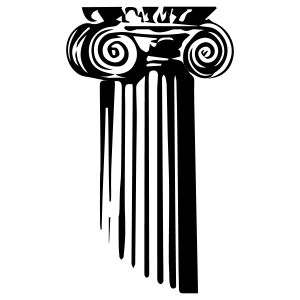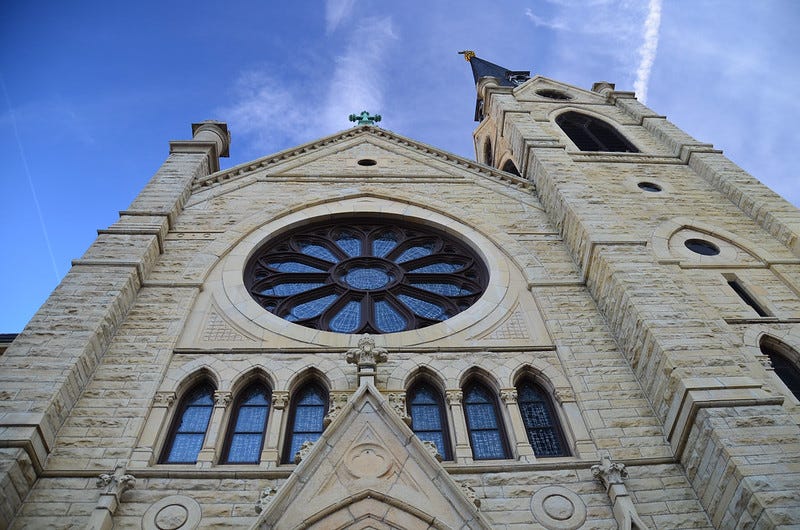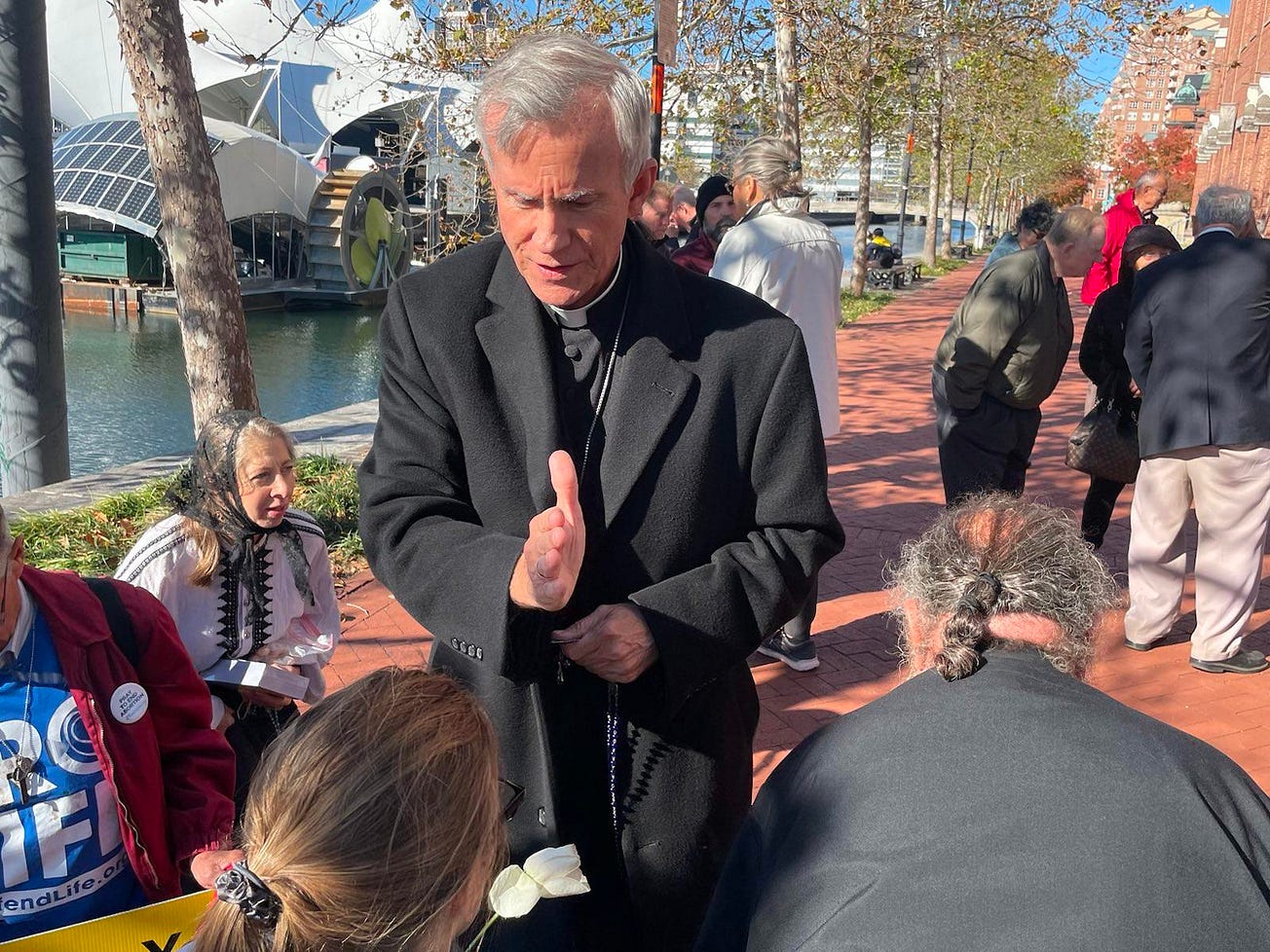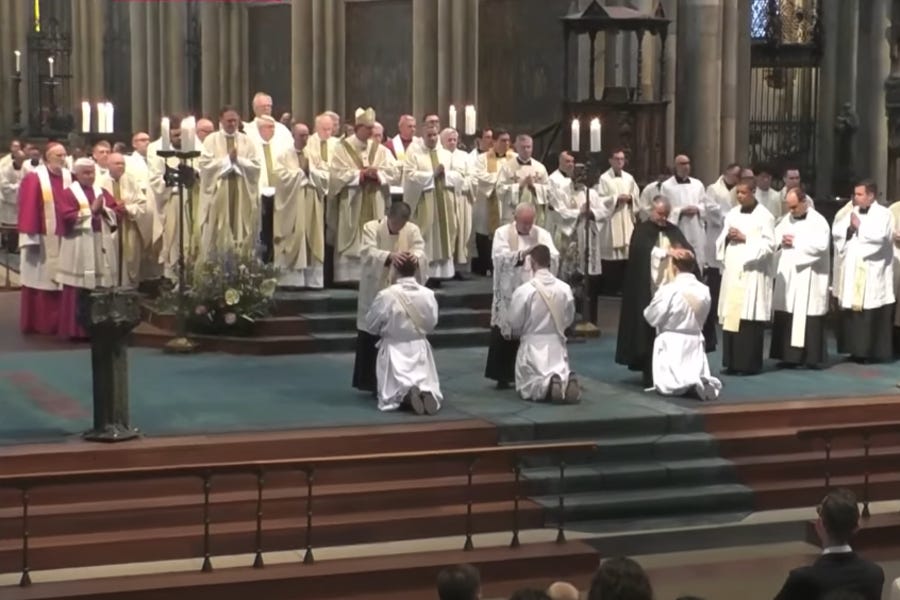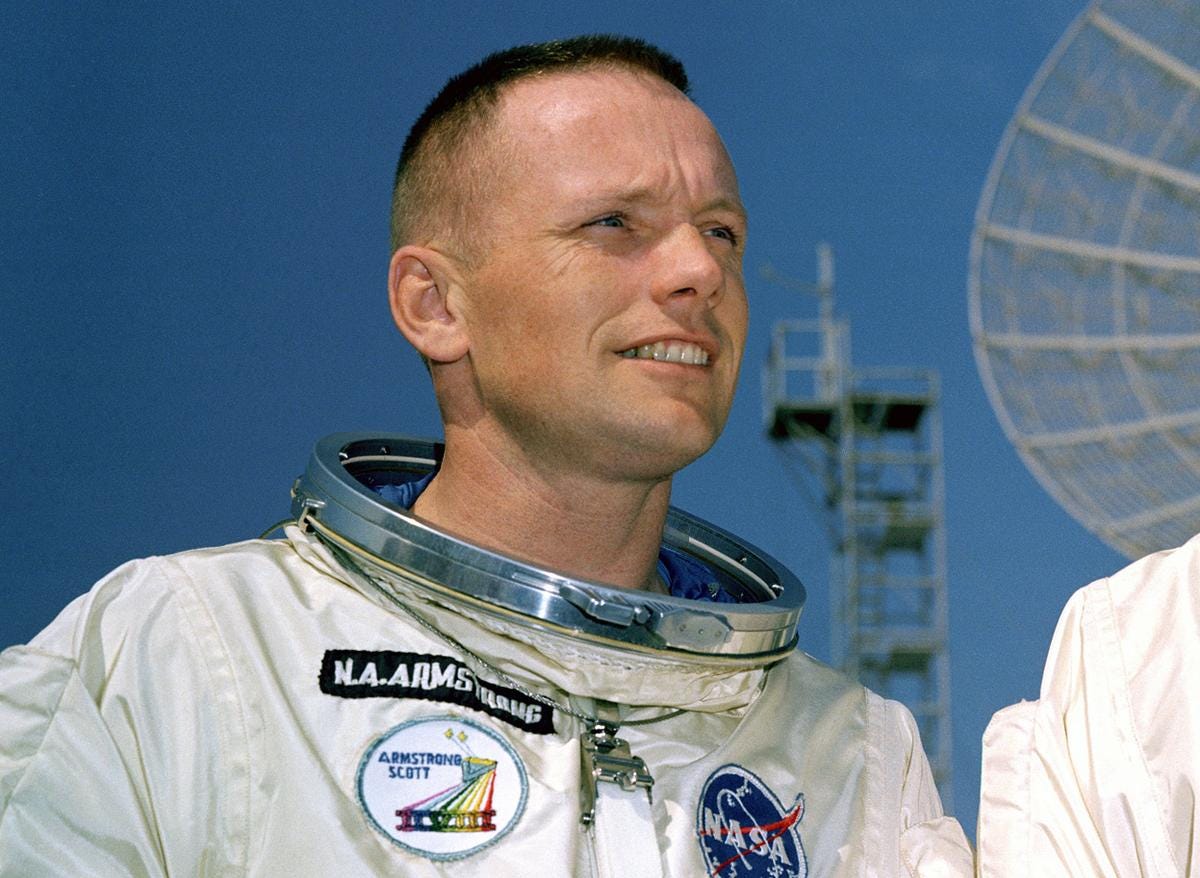Hey everybody,
Today is the Feast of the Visitation, and this is The Tuesday Pillar Post.
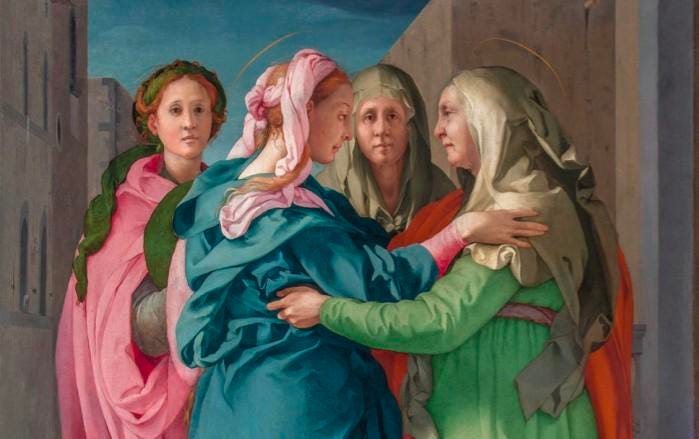
Today is also the last day of Mary’s month — If you haven’t read it yet, this Hopkins poem about the “May Magnificat” is worth reciting in your devotions today:
All things rising, all things sizing
Mary sees, sympathising
With that world of good,
Nature’s motherhood.Their magnifying of each its kind
With delight calls to mind
How she did in her stored
Magnify the Lord.Well but there was more than this:
Spring’s universal bliss
Much, had much to say
To offering Mary May.
Read the whole poem here.
All the news that’s fit to print
Red birds fly
Pope Francis on Sunday appointed 21 cardinals, who will be installed formally as members of the College of Cardinals at a consistory in Rome August 27. Sixteen of them, younger than 80, will be eligible to vote in the next papal conclave, if it comes before they are octogenarians.
The cardinals come from all over - India, Ghana, Nigeria, Singapore, East Timor, among them.
During the years of his pontificate, Pope Francis has now created more than 100 cardinals, from around the globe, with a stated goal of diversifying the college — making it less Eurocentric than it ever has been before. The pope has also dispensed with many of the customs surrounding the appointment of cardinals.
Becoming a cardinal has been traditionally correlated with leadership of a very large diocese. Francis has changed the game — appointing the leaders of very small dioceses in far-flung places and, at least in Europe and America, appointing men with whom he has some personal or theological affinity, even if they are not the leaders of customary “cardinalatial” sees.
In an analysis, Ed looked yesterday at the implications of those changes to the College of Cardinals. And he has a startling conclusion: While commentators - left and right - say often that Francis has “stacked the deck” to assure a successor cut from the same cloth, Ed suggests that the conclave at the end of the Francis pontificate may be one of the most unpredictable in memory.
The American appointed to the College of Cardinals Sunday was Bishop Bob McElroy, diocesan bishop of the Diocese of San Diego. This appointment was a big surprise, even to McElroy apparently — and was a surprise that Fr. Antonio Spadaro, a close papal advisor, said on Sunday was “a strong and clear message for the Church in the United States.”
That idea, that the appointment was meant as a kind of “message,” has been repeated by observers of all stripes in recent days. And most have taken that to mean that McElroy, one of the more outspoken “progressive” members of the U.S. episcopate, should be taken as a reliable interpreter of Pope Francis, or a kind of model for other bishops to follow.
That may well be.
In a piece of analysis Sunday, I pointed out something not especially insightful, which has also been said by a number of news outlets — namely, that McElroy has, as the AP put it, “sparred” with other bishops on a number of issues — including the notion of sacramental discipline for pro-choice politicians, and the relative importance of abortion as a political issue.
That sparring has not usually led to consensus — which suggests that with the cardinal-elect’s newfound stature in Rome, it is reasonable to expect there will be continued division among the U.S. bishops over those issues.
That division, I pointed out, will be among the short or medium-term effects of the McElroy appointment. But in the long-term, the cardinal’s influence, along with that of other U.S. cardinals, probably means an increased number of diocesan bishops who think as he does. So a clash in the short term, but a remaking of the episcopal map in the United States over a longer time horizon.
Indeed, the history of the last several decades in the U.S. Church has been a kind of back and forth like this — there was a period in the 80 and 90s in which several of the influential American cardinals were seen as more “conservative” than the body of the episcopate, and gradually their appointments shifted the balance. Now the converse is operative - some of the most active and outspoken American cardinals could be described as “progressive,” and while the body of the bishops doesn’t fit that description, gradually the selection of like-minded metropolitans and the appointment of new bishops will probably shift things.
There might be readers who find that kind of sociological or political analysis of the U.S. episcopate to be a bit secular, or overly pragmatic, or reductive. Indeed, it is. It’s insufficient to use political sociology to assess the complex relationships between U.S. bishops, let alone to account for how faith, God’s Providence, and the power of the Holy Spirit fit into all of that. But if it’s insufficient, that doesn’t mean it isn’t true. And it does seem true — manifestly and obviously so — that a growing cadre of like-minded cardinals will influence episcopal appointments to reflect their own theological and pastoral priorities. History, if nothing else, bears that out.
Anyway, you can read some initial thoughts about that right here.
I’d also mention accusations that have been raised against Cardinal-elect McElroy on social media over the weekend: the charge that he “protected” or “covered up” for former cardinal Theodore McCarrick’s sexual abuse and coercion, after he was informed of allegations about that abuse in 2016.
It is true that McElroy was informed about allegations against McCarrick in 2016, in a letter from psychotherapist Richard Sipe. The letter mentioned that Sipe had “interviewed twelve seminarians and priests who attest to propositions, harassment, or sex with McCarrick,” and asked McElroy to address it.
In 2016, McElroy was Bishop of San Diego, with no authority over McCarrick, and no authority to investigate him. The bishop says that he sent Sipe’s letter to the apostolic nunciature or the Holy See, even though he declined some meeting requests from Sipe — which McElroy says he declined because Sipe hadn’t been forthcoming with him about the details of his allegations.
If McElroy’s account is true — that he received unnamed allegations, couldn’t get the names, and sent them on to his superiors — it does not seem to me that demonstrates a “cover-up,” largely because I’m not sure what else the bishop was supposed to do — he lacked the authority to investigate, and he says he couldn’t get additional information from the person informing him.
Today the bishop would direct such a person a third-party reporting line, and, again, inform ecclesiastical authorities. But in McElroy’s case, the third-party reporting line didn’t exist.
There might be more to the substance of the charges against McElroy than I have understood — but if I’ve got the facts right, I must admit I’m not clear on what else he was supposed to do with what he received.
A Ukrainian surprise council
The Ukrainian Orthodox Church of the Moscow Patriarchate had a surprise “Sobor,” or solemn Church council, on Friday, in which the Church voted to affirm its “full independence and autonomy” amid growing frustration with the Orthodox Patriarch of Moscow, Patriarch Kirill.
The move came on a day when a kind of Church “listening session” was planned — but that session quickly led to the declaration of a Sobor, an authoritative gathering which exercises supreme legislative, administrative, and judicial authority in the UOC-MP.
This was, in short, a very big deal, for those following the shake-up of Orthodoxy amid the Russian invasion of Ukraine. But, like all things ecclesiastical in the region, there is still a lot of disagreement about what it actually means, whether it was really intended as a break from Moscow, and, if so, what would happen next.
And stay tuned. This is not a little disagreement about jurisdiction or authority. This is a significant event, which could have ecclesiological implications for Christians around the world. We have right now a front-row seat to an important chapter in the history of Orthodox Christianity, and we’ll stay on the story. Count on it.
Cardinal Sodano
Cardinal Angelo Sodano, one of the most central figures in the John Paul II papacy, died Friday at the age of 94. Pope Francis attended his funeral this morning, as did other influential Vatican churchmen.
But Sodano was also central to some of the troubling moments and choices of the Church’s 20th century history. The cardinal protected notorious abuser Marcel Maciel, was an outspoken supporter of Chilean dictator Augusto Pinochet, and was a staunch defender of the controversial Ostpolitik Vatican foreign policy.
Read his obituary, and then do His Eminence a favor: pray for the eternal repose of his soul.
This Pillar Post is brought to you by Seton Home Study School.
Seton assists homeschooling parents by providing an academically excellent and authentically Catholic curriculum.
Is homeschooling right for your family? Learn more from Seton Home Study School.
The ‘Vos estis’ experiment
Vos estis lux mundi — the set of canonical policies promulgated by Pope Francis for investigating allegations of abuse, misconduct, or administrative negligence on the part of the Catholic Church’s bishops — took effect three years ago today, for a three-year experimental period.
The Holy See has not announced a continuity of that period, but until some announcement, the operative understanding is that the policy remains in force.
Still, some bishops have been asked for input on revisions to the policy, which will probably be underway over the next several months.
Whatever bishops will say, we thought it was worth asking a victim-survivor, victims’ advocates, diocesan administrative leaders, and other policy experts what they think Vos estis needs, and whether they think it has actually worked to reform the Church.
We have input from a number of important voices, in a kind of symposium of ideas, and I hope you’ll read them all. But here are a few thoughts especially worth reading, from victim-survivor and advocate Teresa Pitt Green:
Vos estis is not a perfect document but for those of us seeking reform within the Church, at least it has dared to grapple with issues that must be resolved before the whole Church, as a family, can heal along with survivors of clergy abuse and with their loved ones.
…
I’d ask Catholics to consider how this document must apply to every culture in every region of the globe where the Catholic Church is found, and yet cultures vary greatly. Even the concept of child safeguarding in these areas varies greatly for many reasons, for example, national law, social customs, and political strife.
When it comes to dealing with such things as sexual behavior between a priest and a vulnerable adult, it will take a while for the Church to develop an approach that is culturally sensitive and morally sound.
That does not preclude the United States from moving forward by building on the strong, if somewhat precarious, foundation of the Charter, but Catholics need to make distinctions between what they expect in the United States and in the universal Church overall.
One would wish “priests remain chaste” would be enough, but this is a fallen world, and we must face that sometimes priests, too, are vulnerable. I think, as Vos estis evolves, Catholics in the United States are going to need to grapple with distinctions among abuse scenarios that we who are working in this area, see daily. That is, all abuse is wrong, but the abuse of a child is different from the abuse of a disabled adult, and both are different from the abuse of an adult who is vulnerable to a priest due to spiritual formation. Such diverse scenarios will warrant different responses from the ordinary — and from the faithful.
And here’s Stephen White, executive director of the Catholic Project at The Catholic University of America:
The success of the law will also be measured by whether or not it restores a measure of credibility to the Church’s promise to hold bishops accountable.
In short, the law must work and also be seen to be working.
In this regard, the most significant challenge for the next iteration of Vos estis lux mundi may not be found in any provision of the law itself, but in the lack of transparency surrounding the application and implementation of the law.
Currently, it is exceedingly difficult to get reliable information about the process as it operates. Basic questions remain unanswered, even after allegations that would seem to fall under Vos estis become public:
Who is currently under investigation? Which dioceses or sees are conducting investigations? Why did this case merit investigation but not a similar case? What conclusions if any resulted from a given investigation?
As often as not, at least in the U.S., these sorts of questions go unanswered. As often as not, it falls to local diocesan staff to rebuff inquiries from press and upset or angry members of the faithful in order to satisfy Rome’s preference for silence. Indifference toward transparency at the highest level breeds distrust at the local level.
Read our entire Vos estis symposium of ideas here.
Cardinal Okpaleke
Among the most interesting men to be appointed a cardinal this Sunday is Bishop Peter Okpaleke, a Nigerian who is Bishop of Ekwulobia in southern Nigeria.
What’s most interesting about Okpaleke is where he isn’t the bishop — the Diocese of Ahiara.
Okpaleke is a member of the Igbo ethnic group, which constitutes more than 15% of Nigeria’s population and is predominantly Christian. He became a priest in 1990, and worked as a pastor, a college chaplain, and diocesan administrator.
In 2012, Pope Benedict appointed Okpaleke the Bishop of Ahiara, which is close to the heart of Igboland, but is composed mostly of Christians of the Mbaise ethnic group.
The clergy and people of Ahaira insisted that they be given a bishop who was himself Mbaise. They did not accept Okpaleke as their bishop.
A four-year standoff ensued.
In June 2017, Pope Francis told the priests and deacons of the Ahiara diocese that they had 30 days to write to him, pledging obedience to the pope, and affirming Okpaleke’s leadership.
More than 200 clerics wrote to Francis, affirming their obedience, but with many claiming the Holy See failed to appreciate the tribal and ethnic culture of their diocese, and was effectively discriminating against them. Francis urged them to reflect on the “grave damage” they were causing the Church.
The standoff continued, until Okpaleke himself broke it.
In 2018, seeing how all of that had shaken the faith of the Ahiara diocese, and had become a focal point of years-long controversy, Okpaleke resigned his appointment as Bishop of Ahiara.
He said that his apostolate in the Ahiara diocese could not possibly be effective.
Two years later, Okpaleke was appointed Bishop of Ekwulobia. On Sunday, he was named a cardinal.
The Ahiara diocese is still without a bishop.
The Church is bigger than the United States, it faces unique cultural and historical challenges wherever it proclaims the Gospel, and each one requires wisdom, fidelity, and holiness to untangle.
May God continue to guide his Church.
—
We’ll have more news from the life of the Church for you this week.
If you think The Pillar is doing journalism worth paying for, please subscribe, and tell your friends. We think our work, to do fair, clear, honest Catholic reporting about the life of the Church matters. We hope you do too.
If you want to advertise in The Pillar Post and The Pillar Podcast, email us.
And please, know of our prayers, and please continue to pray for us.
In Christ,
JD Flynn
editor-in-chief
The Pillar
—
This Pillar Post is brought to you by Seton Home Study School, an accredited school assisting homeschooling parents with an academically excellent and authentically Catholic curriculum.
—


